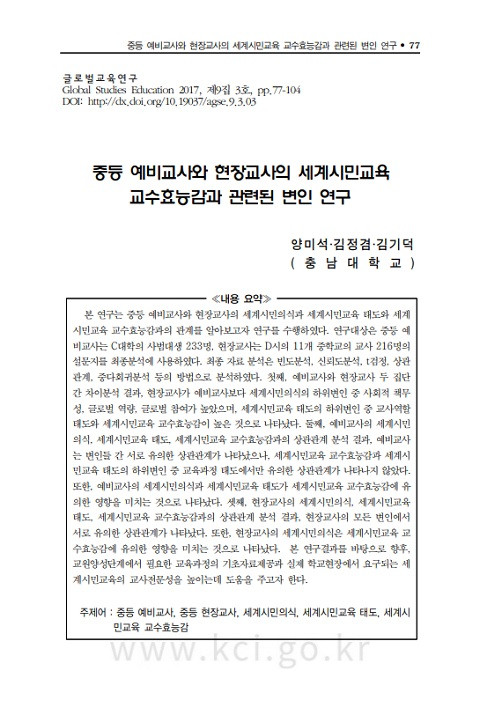
GCED Basic Search Form
Quick Search
Vous êtes ici
Ressources

This study explores relations between global citizenship and global citizenship education attitude of pre-service and in-service secondary teachers and their global citizenship education teaching efficacy. The subjects of this study were 233 students majoring in education of University C as pre-service secondary teachers and 216 teachers of 11 middle schools in City D as in-service teachers. of whom questionnaires were used for final analysis. The final analytic methods of data include frequency analysis. reliability analysis. T-test. correlations and multiple regression analysis. First. the result of difference analysis of the two groups of pre-service and in-service teachers shows that in-service teachers are more scored in social responsibility. global capacity and global participation among the lower factors of the global citizenship and in teacher role attitude and global citizenship education teaching efficacy among the lower factors of the global citizenship education attitude than pre-service teachers are. Second. the result of analysis of correlations among global citizenship. global citizenship education attitude and global citizenship education teaching efficacy for pre-service teachers shows that the factors of pre-service teachers have mutually significant correlations except for curriculum attitude among the lower factors of the global citizenship education teaching efficacy and of the global citizenship education attitude. Furthermore. global citizenship and global citizenship education attitude of pre-service teachers affect significantly their global citizenship education teaching efficacy. Third. the result of analysis of correlations among global citizenship. global citizenship education attitude and global citizenship education teaching efficacy for in-service teachers shows that all the factors of in-service teachers have mutually significant correlations. And global citizenship of in-service teachers has significant influence on their global citizenship education teaching efficacy. The results of this study are expected to help provide fundamental data for curriculums required in teacher training courses and enhance teachers’ professionalism on global citizenship education in the future.
